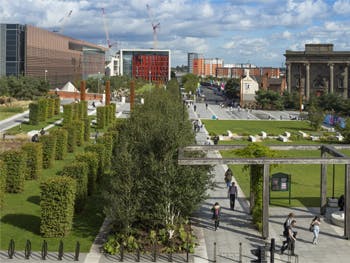Birmingham City University has been shortlisted in three categories of the prestigious Times Higher Education (THE) Awards 2021
Birmingham City University has been shortlisted in three categories of the prestigious Times Higher Education (THE) Awards 2021.
Widely recognised as the ‘Oscars’ of higher education, the THE Awards celebrate ‘outstanding’ work across a wide range of university activity. This year saw a record number of entries, with almost 600 projects, teams and individuals being put forward by institutions around the UK.
The University’s Sir Lenny Henry Centre for Media Diversity has been shortlisted for the Outstanding Contribution to Equality, Diversity and Inclusion title, for its work examining diversity across the UK’s media. This landmark new research centre looks at representation across the industry including journalism, acting, film, TV and radio in both front-of-house and behind-the-scenes roles.
The Centre aims to critically analyse policies in the media industry with a view to increasing diversity and inclusion, improving policy decisions and spreading best practice. Since the announcement that the centre was being set up, it has been approached by many organisations and individuals working to improve diversity in the media, as well as major media outlets who are asking for advice or consultancy research. It has delivered research-based recommendations to Channel 4, among others.
The University’s transformation of its Seacole Building into a dedicated Covid-19 training centre for NHs workers has been shortlisted for Outstanding Contribution to the Local Community. In April 2020, the University played a key role in the local response to the coronavirus crisis by providing essential skills training to student nurses, existing NHS staff who were returning to practice and staff being redeployed to critical care areas. The University’s action saw the reopening of the Seacole Building, with the rapid development and delivery of a logistical plan involving staff mobilisation, collaboration, skills mapping and prioritisation of clinical service needs.
Over a thousand clinicians, including the University’s students, received a far-reaching training programme covering eight different skills needed to take on frontline NHS roles in the fight against the virus. This programme was innovative, cost-effective and all risks to patients eliminated, as the learning took place within the City South Campus with its state-of-the-art facilities.
Birmingham City University’s School of Law’s Universal Periodic Review (UPR) Project is on the final list for International Collaboration of the Year. This project sees the University work with the United Nations’ Human Rights Council as one of the organisations providing reviews of the human rights record of all UN member states.
To date, the UPR Project has submitted seven stakeholder reports to selected countries’ UPRs, which have consistently been cited by the UN, and has engaged in two Pre-sessions. This has included reports on capital punishment, climate change and compassionate release for prisoners in the USA; the abolition of capital punishment in Myanmar; the rights of women and girls with HIV in Namibia; and human rights violations in Sudan.
The final winners in each category will be announced at this year’s awards ceremony, which is due to take place on 25 November in central London.

